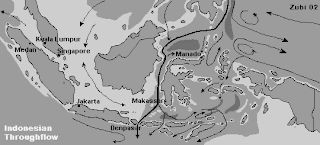Komodo is just as famous for its currents as it is the dragons that roam topside. It’s thought to be home to some of the most challenging recreational diving in the world.
Part of the cause of these currents is the ‘Indonesian Throughflow’. In a nutshell, the Indonesian Throughflow is a term used to describe the movement of water between the Pacific Ocean in the North and the Indian Ocean in the South. A special measurement expresses the volume of water movement. This is the Sverdrup. Around 20-22 Sverdrups flow through the National Park. To understand how much water this is, think of a river that is 100 metres wide, 10 metres deep and flows at speeds of 4 knots, then imagine 10000 of those rivers combined together. That’s the volume of water we’re talking about!
So, this rush of water back and forth through the islands, brings with it nutrients and cooler waters and these nutrients give us incredibly healthy reefs and species diversity. In addition, this water movement through the narrow channels and the underwater topography creates Komodo’s famous currents.
So what does this all mean for diving? A challenge, a great learning experience and a chance to see some of the most incredible marine life on the planet.
Here are some Dos and Donts for diving in currents.
- Do be aware that Komodo diving is for everyone and sites can be dived in many ways to accommodate all levels of experience
- Do communicate with your dive guide both on the surface and underwater. If you are uncomfortable or have a problem we need to know.
- Do relax. Maintain a regular breathing pattern
- Don’t fin like crazy against a current. Take a break before you exhaust yourself
- Do swim close to the bottom or reef to reduce the strength of the current
- Do watch your guide and try to mimic their body position for most efficiency
- Don’t stray too far from your buddy or guide in strong current. Risk of separation and other problems can increase. Also, Wicked Dive guides all carry 2 way submersible radios to communicate with the boat should a problem arise, so they’re good people to stick close to!
- Do listen to the dive briefing and don’t be afraid to ask questions
- Do practice good buoyancy control and finning techniques. Courses are available to help you improve that.
- Don’t’ forget that some of the most incredible marine life can be seen in currents. There’s nothing like flying along in a crazy drift at Karang Makassar and seeing 7m flying towards you or being sat in the middle of a baitball at Castle Rock with sharks and tuna in a feeding frenzy around you!

Happy diving!!!


No comments:
Post a Comment